The Hindu god Shiva is known as the Auspicious One and the Destroyer—both of which actually seem … kind of auspicious. But in the realm of metal, the history of named-checked deities typically runs more along the lines of Odin, Thor, Mephistopheles, or even Cthulhu. Shiva, despite the impressive appellations, is rarely the subject of songs—with one notable exception.
That's the music of the Mumbai-based metal trio Midhaven, who, with the release of their latest album, Of the Lotus & the Thunderbolt, now have two song cycles to their credit in which Shiva figures prominently. The band spent 2019 writing and recording the project, which was produced by Apurv Agrawal, and mixed and mastered by engineer Forrester Savell (Animals as Leaders, Karnivool). Then it sat in the can for a year waiting for the pandemic to subside. When it didn't, Midhaven finally decided to release Of the Lotus & the Thunderbolt anyway. It's a concept album, based on the cyclical nature of time, mapping out the course of a soul's journey to enlightenment, with Shiva—in Destroyer mode, naturally—as an overarching presence.
'Primal Song' Music Video
Such heady notions are part of the decade-old band's DNA. They took their name from the astronomical term "midheaven," for the highest point in a celestial object's daily traverse, and started weaving songs into complex yarns with their debut EP, 2012's Tales From The Tide. Those three songs ended up being a teaser of sorts for their first full-length album, 2014's Spellbound, which explores the hallucination of a man who, in the imagined form of Shiva, kills the Greek god Apollo.
Seven years later, Of the Lotus & the Thunderbolt has arrived like a … thunderbolt. Throughout, Midhaven combine operatic vocals and guttural growls with monster guitar riffs that sound like Godzilla tearing down high-tension wires over some unfortunate city. The first single, "Primal Song," assays their gargantuan sound, and the tonal fusion between guitars and bass (the latter courtesy of Jason D'Souza) is electrifyingly monstrous. Tracks like "Codeman" and "Para Brahman" may be more melancholic and anguished, but the riffs are titanic, while "Zhitro" and "Mahakaal" introduce elements of Indian folk music, using guitar orchestrations that combine the contemporary with the traditional.
"At some point, Mastodon really picked me up by the neck—just grabbed me. Brent Hinds is definitely a huge inspiration."—Karan Kaul
Navigating such lofty lyric and sonic terrain are guitarists and close friends Karan Kaul and Aditya Mohanan, who, along with drummer Aviraj Kumar, are the core of Midhaven. Kaul is also the lead vocalist, while Mohanan handles the majority of lead guitar duties. "There are very set roles that just came to be through our synergy," explains Kaul. "Aditya is the scorching guitar player, and I'm more of the backbone, heavy, 'chuggy' [rhythm] guy." And while their roles may be set in terms of guitar duties, songwriting is another matter. "We have this very interesting synergy going on," explains Mohanan. "It's not like one of us is composing a riff. It's like, one of us comes up with an idea and the other one feeds into that idea—adds or subtracts from it, and keeps altering it, and by the end, we can't really tell who it came from. It's the approach we've taken to every song."
They cite Black Sabbath and Metallica as influences, as well as a slew of other two-guitar bands. "At some point, Mastodon really picked me up by the neck—just grabbed me," says Kaul. "Brent Hinds is definitely a huge inspiration." For Mohanan, metal started at Megadeth. "Everyone talks about, 'Are you a Metallica fan or a Megadeth fan?' Marty Friedman is like a god to me," he professes. "I just worship him … and Dave Mustaine—that's where it started off. I love Brent Hinds as well. I like the way he approaches his reverb and his tone and his delays." Mohanan also infuses Midhaven's music with older sources of inspiration. "I really enjoy Bach, Beethoven, Mozart," he admits. "I went through a phase that was neo-classical. And then, around the time this album was being written, I was super into Indian classical and folk forms as well, like [Indian Carnatic vocalist] T.M. Krishna."
Karan Kaul’s Gear
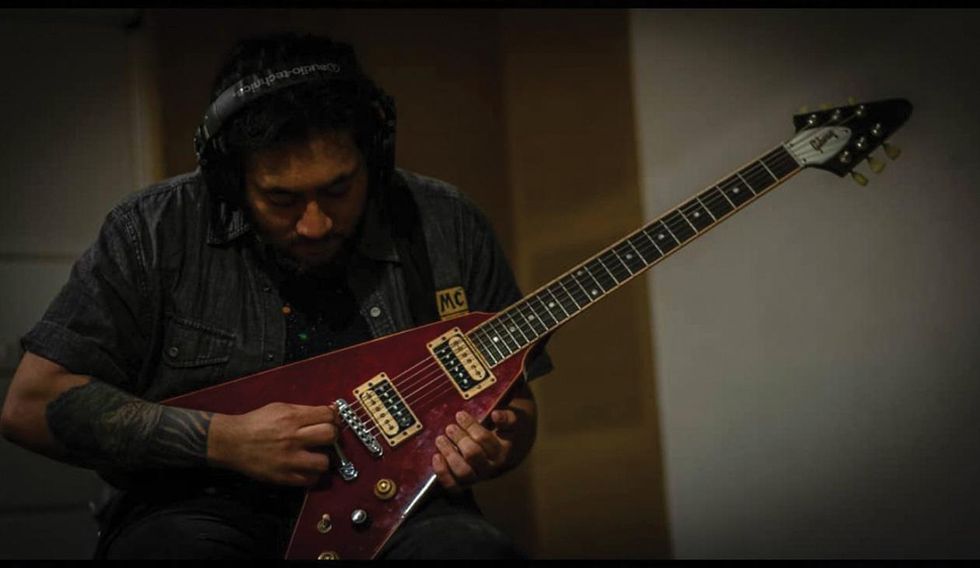
Karan Kaul, who fronts the band, rocking his Gibson Flying V in the studio.
Photo by Mehran Sheikh
Guitars
- ESP Eclipse with Fishman Fluence Signature Series Devin Townsend pickups
- Gibson Flying V (2012)
Effects
- Animal Factory Godeater
- Boss RE-20 Space Echo
- EarthQuaker Devices Erupter Fuzz
- Ibanez Tube Screamer
Amps
- Laney Mini Ironheart (15-watt, studio only)
- Laney GS212VR cab
- Egnater, Vox, Marshall JCM800, or Mesa/Boogie Triple Rectifier (live, depending on availability)
Strings & Picks
- Elixir 12152 (.012 –.052; studio)
- D'Addario NYXL 1260 Extra Heavy (.012 –.060; live)
- D'Addario Planet Waves Duralin Black Ice
Nowhere is the Indian influence more apparent than on the closing number, "Bhairav." With its trippy, atmospheric, sitar-like outro, Mohanan says it is the most tonally explorative song on the album. "With 'Bhairav,' we wanted to get this weird transience that any Indian classical instrument inherently has. The only way to sustain a note for that long was through the 'twang' element in the sound. The transience that I'm talking about is that slight buzz that accompanies the sound of the instrument. We wanted to make it a lot more psychedelic sounding; otherwise you can just use the Electro-Harmonix Ravish Sitar pedal." In an effort to make it sound "spacey," they experimented with a metal slide, an MXR Phase 90, an EHX Holy Grail, and a Strymon blueSky. "That was all an improvisation," he says. "We picked out parts that sounded really great with each other and put it together."
"We would use really abstract terms to describe the tones that we wanted to create, like, 'I want wet fire.'"—Aditya Mohanan
Musically, the laconic vibe of "Bhairav" plays into the overarching theme of time and evolution that lyrically fuels Of the Lotus & the Thunderbolt, but Midhaven cunningly manipulates the musical timing in "Zhitro," a song that intentionally speeds up over nine minutes and 36 seconds. "A lot of people don't notice it, but we actually increase tempo," reveals Kaul. Mohanan was in the studio with drummer Kumar while tracking, and says that, while it's natural to speed up without a click, "To keep the click rising slowly, slowly, slowly, is always a gamble."
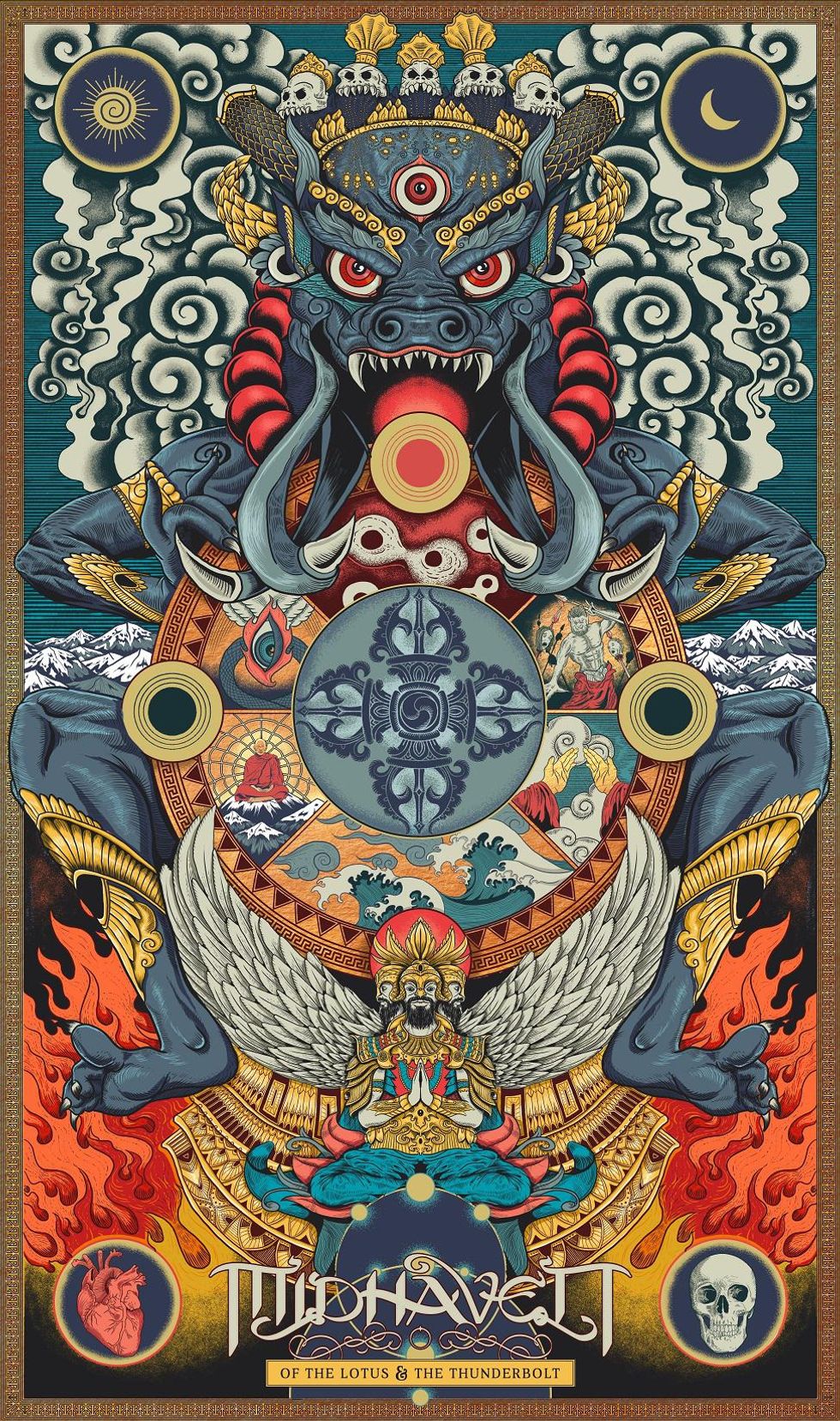
TIDBIT: This is the expanded format artwork for Midhaven's new album. Karan Kaul and Aditya Mohanan used small amps in the studio, for easier tracking, and took pains to keep out of each other's sonic terrain—which was especially important, since all the songs are in drop-B tuning.
According to Kaul, there is "not a drop of digital" in their guitar tones on Of the Lotus & the Thunderbolt. He and Mohanan are self-professed "straight-through-the-amp kinds of guys," and they attribute much of the record's massive sound to their producer, Apurv Agrawal, also known as Cowboy and Sailor Man via his chillwave/synthwave project of the same name. "He's just a fantastic person to work with," professes Kaul. "He really helped us sculpt our tones on this record." Mohanan says he has never seen anyone take tone as seriously as Agrawal. "He took our feedback and took it a step further. He added his own creativity. We would use really abstract terms to describe the tones that we wanted to create, like, 'I want wet fire,' and Apurv would just be like, 'You know what? I know exactly what you're talking about. And you know what? I can get you something even better than that.' That's that guy." Kaul jokingly says he's going to ask Agrawal for "dry water" on the next album.
"It's the kind of song where you need both guitars to be really cut-throat, really hot."—Karan Kaul
All the guitar tracks for Of the Lotus & the Thunderbolt were recorded old school: miked amps and real pedals. For guitars, Kaul primarily used his ESP Eclipse, with Fishman Fluence Signature Series Devin Townsend pickups, which gave him three voices to play with. "I can control everything from just one guitar—how much weight I want to add and how much tone I want to cut." Mohanan relied on his Schecter Diamond Series SLS Avenger with Seymour Duncan pickups. "It's got a coil tap," he says. "I can get any sort of tone I want, at least for Midhaven, with that guitar, but my situation was a little more complicated. I think when you play lead on the stage, you want to be able to switch to clean channels."
Aditya Mohanan’s Gear

Lead guitarist Aditya Mohanan mostly relies upon his Schecter Diamond Series SLS Avenger but is seen here holding an ESP Eclipse.
Photo by Mehran Sheikh
Guitars
- Schecter Diamond Series SLS Avenger with Seymour Duncan SH-3 pickups
Effects
- Animal Factory Godeater
- Boss DD-3 Digital Delay
- Boss RV-6 Digital Reverb
- Electro-Harmonix Holy Grail Nano
- KHDK Dark Blood
- MXR M101 Phase 90
- Strymon blueSky Reverberator
- TC Electronic Spark Booster
Amps
- Orange Dark Terror (15/7 watts, studio only)
- Orange PPC112 cab
- Egnater, Vox, Marshall JCM800, or Mesa/Boogie Triple Rectifier (live, depending on availability)
Strings and Picks
- Elixir 12152 (.012 –.052; studio)
- D'Addario NYXL 1260 Extra Heavy (.012 –.060; live)
- Dunlop 427PJP John Petrucci Jazz III
Because of the sonic bandwidth two-guitar bands compete for in the studio, Mohanan says "Bhairav" was also the trickiest tune to get, tone-wise. "It's the kind of song where you need both guitars to be really cutthroat, really hot. And it was so tricky finding a frequency bandwidth where both of us would not clash with each other, but at the same time complement each other, while being really high-octane." Kaul remembers: "Because you [Mohanan] recorded it first, Apurv and I were just looking at each other, 'How do we get this to cut?'" [laughs]
"It was so tricky finding a frequency bandwidth where both of us would not clash with each other, but at the same time complement each other, while being really high-octane."—Aditya Mohana
Another reason the guitars are likely vying for frequency range is that all of the songs on the new album are in drop-B tuning. Kaul says playing in that tuning came quite naturally, referring to it as "home," because it's a comfortable range for him vocally. But Mohanan says he likes drop B because the tuning adds a unique flavor to chord voicings. "When you play a major sixth on a low-end, drop B, it just sounds altered."
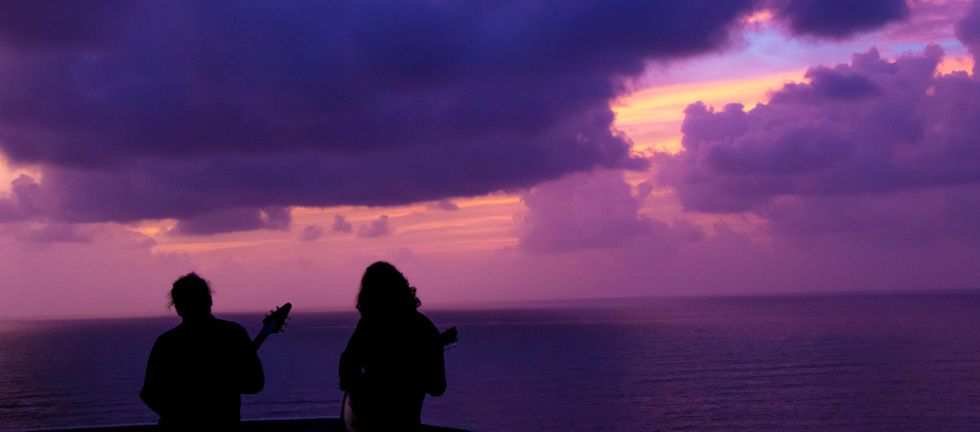
Midhaven's high-energy blend of full-blooded metal influences and Indian traditional music mesh to create a distinctive and trippy signature sound.
Photo by Mehran Sheikh
As for amps, they use little boxes, strategically, to get big studio tones. Kaul plugged into a Laney Mini Ironheart—a 15-watter—and a Laney GS212VR cab. Mohanan deployed an Orange Dark Terror, switchable between 15 and 7 watts, and an Orange PPC112 cab.
Other essential components of their rich guitar tones include an Ibanez Tube Screamer that Kaul employs to add a slight bit of gain to his tone. Mohanan says Kaul's tone is generally "a super wet, really warm, sloppy kind of a tone," and that the Tube Screamer "cleans that up just a little bit." Mohanan says his Dunlop John Petrucci Jazz III picks give him an edge, performance-wise. "It just glides across the string," he says. "And it's just really great for pinching [harmonics]. If you want attack, you can get that out of them—and they work really well with the coil-tap." Mohanan says the coil-tap was a game changer in terms of manipulating his tone. "Even in 'Zhitro,' when I'm switching from clean to distortion, I'm not just turning on my distortion pedal in that moment. I'm also switching from a single-coil to a humbucker—it gives that extra boost. I've experimented with that a lot in Midhaven."
In a way, the massive guitar tracks heard on Of the Lotus & the Thunderbolt echo the conceptual theme of a journey to higher levels. Like the album's main character—the human one, not Shiva—the members of Midhaven have musically grown in the past two years, and, "in hindsight," observes Mohanan, "I think the album definitely would be different if it were recorded today."
YouTube It
East meets West in this 2017 live performance by the Midhaven lineup that made Of the Lotus & the Thunderbolt. The rock is there (check out Aditya Mohanan's solo on his Schecter Diamond Series SLS Avenger at 3:08), but the droning, microtonal influence of traditional Indian music echoes between both guitars in the intro's subtle ramp-up.
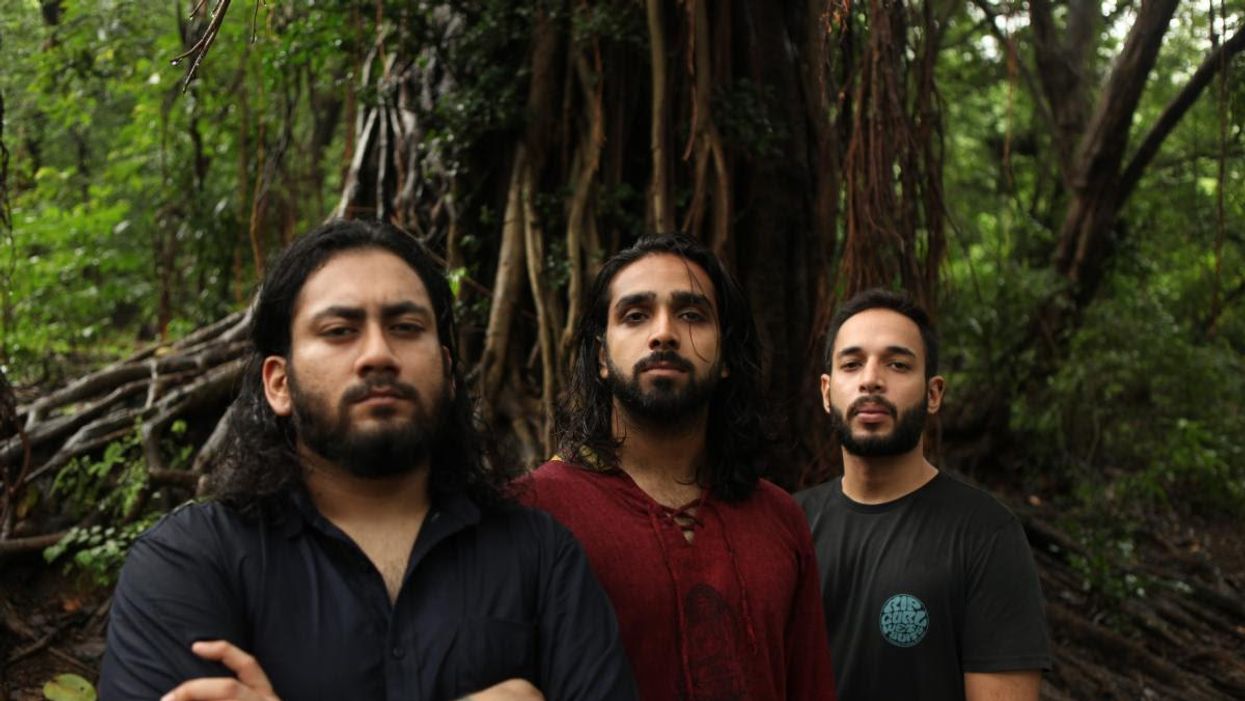






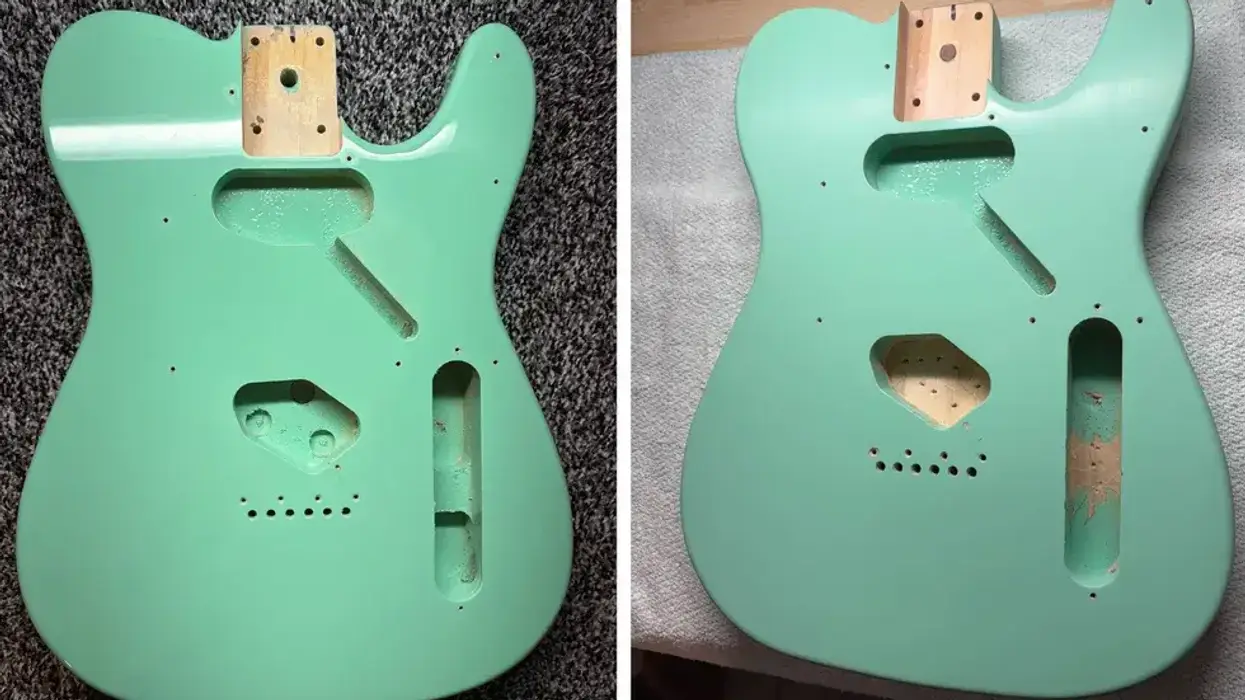



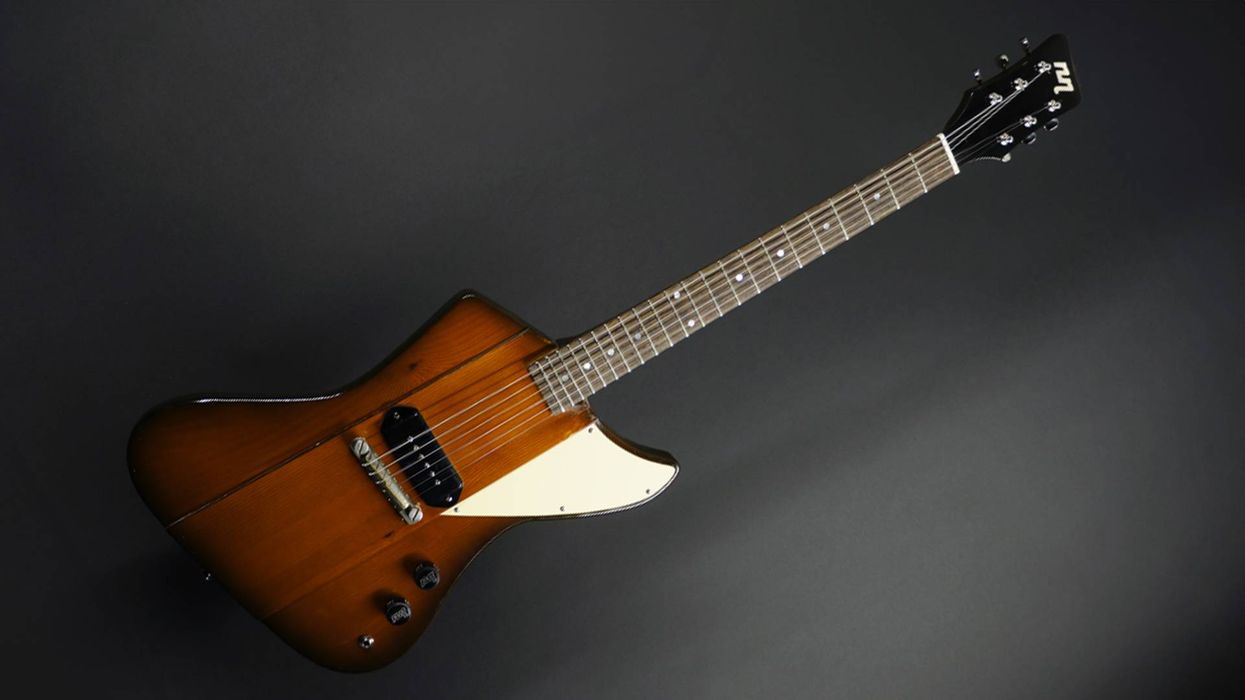












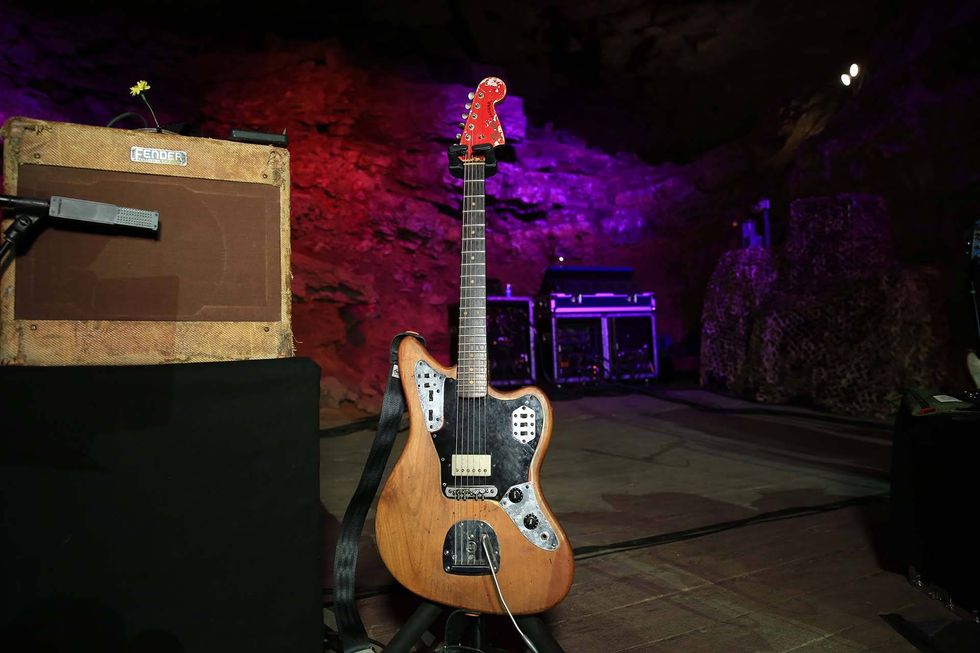
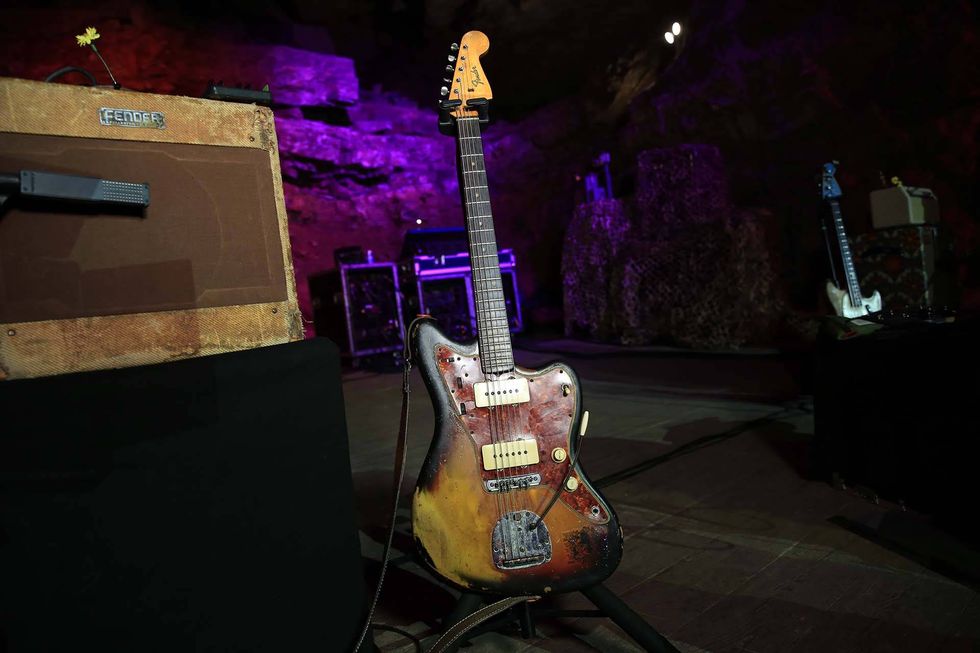
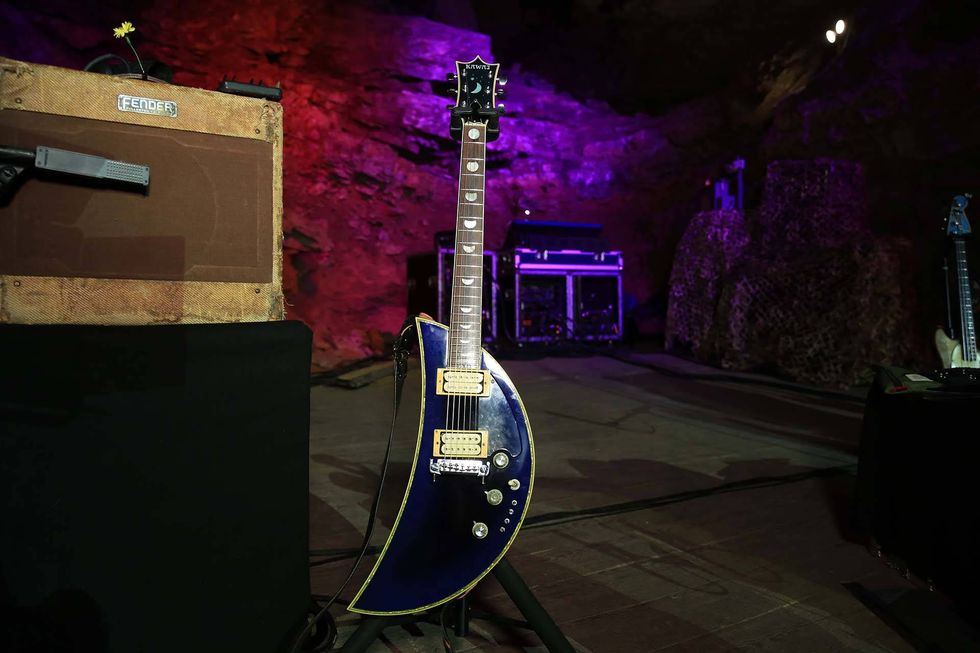
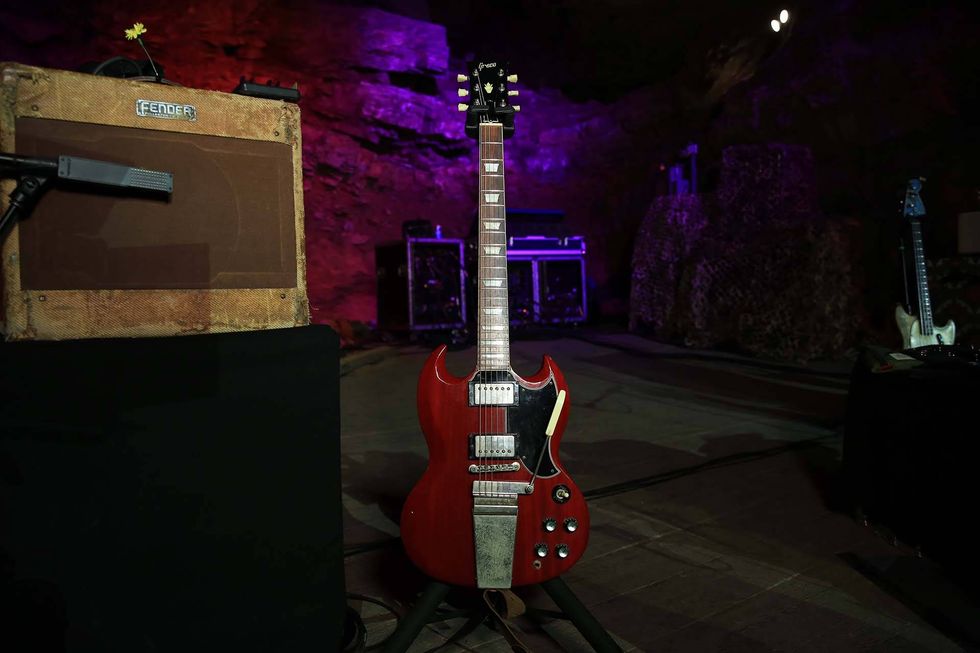
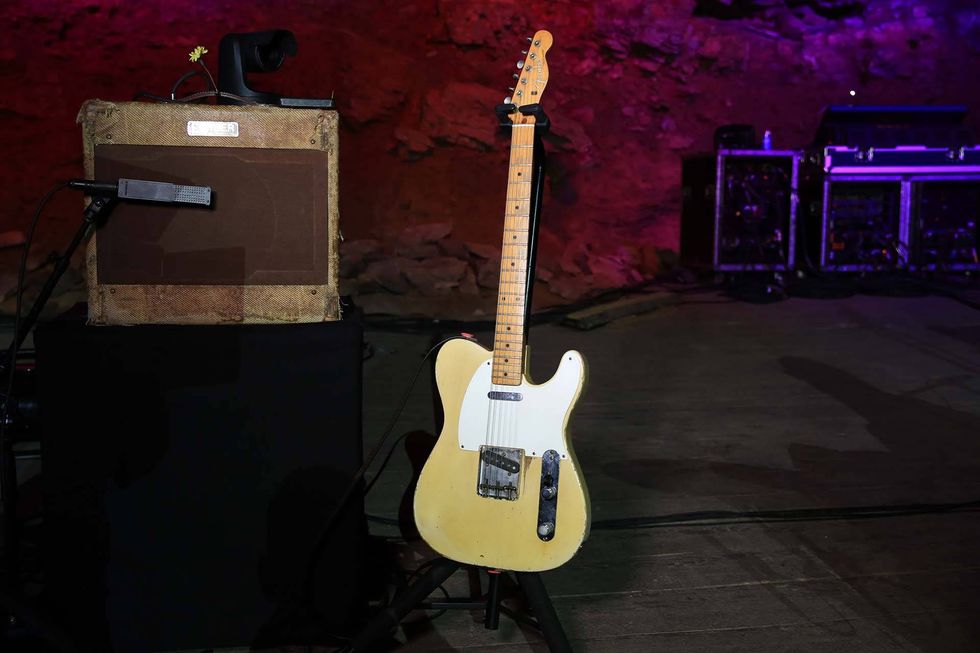
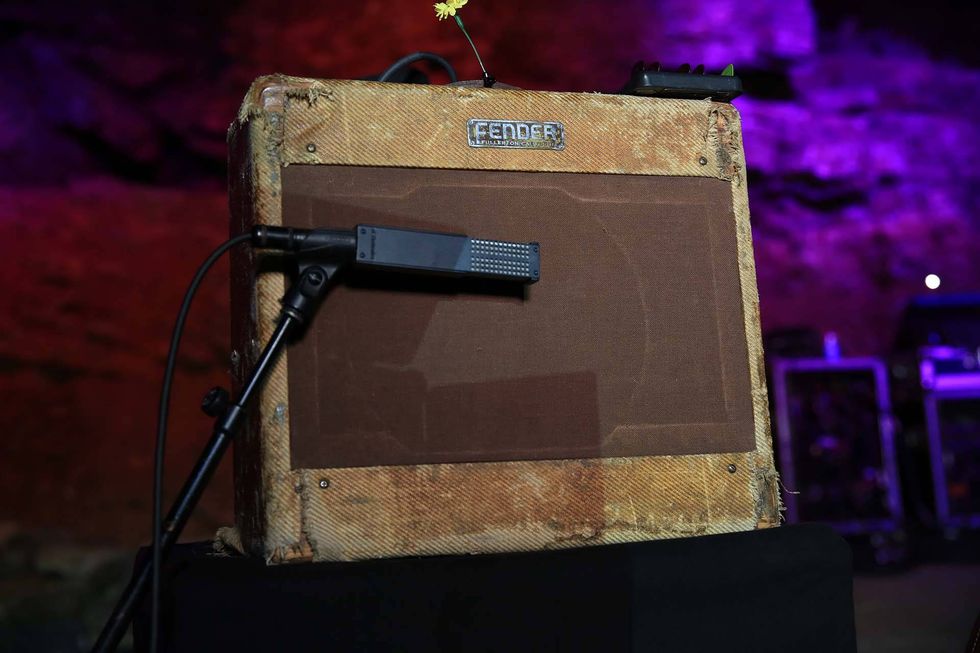
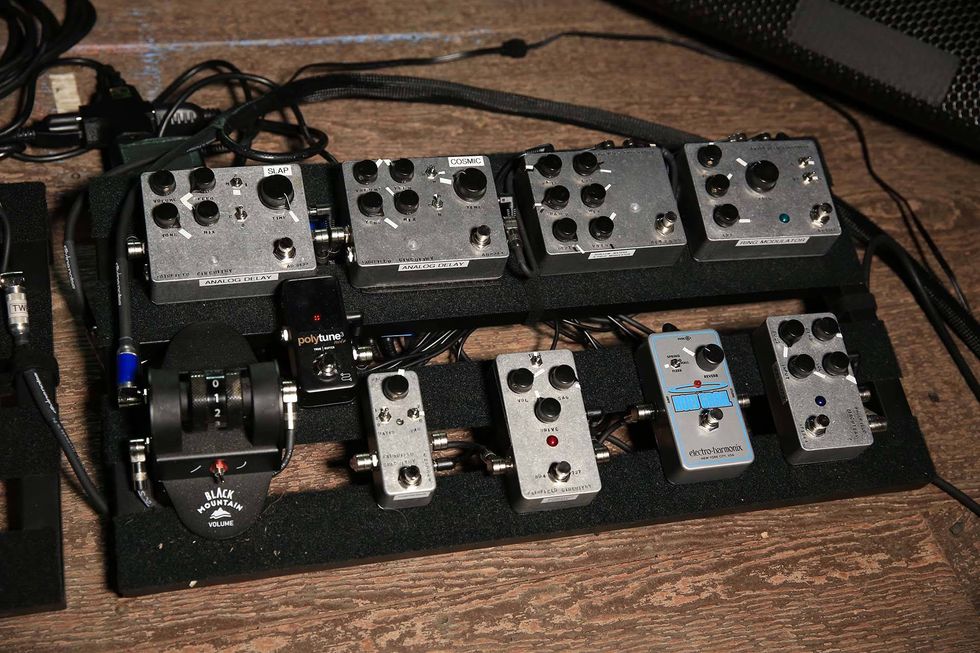
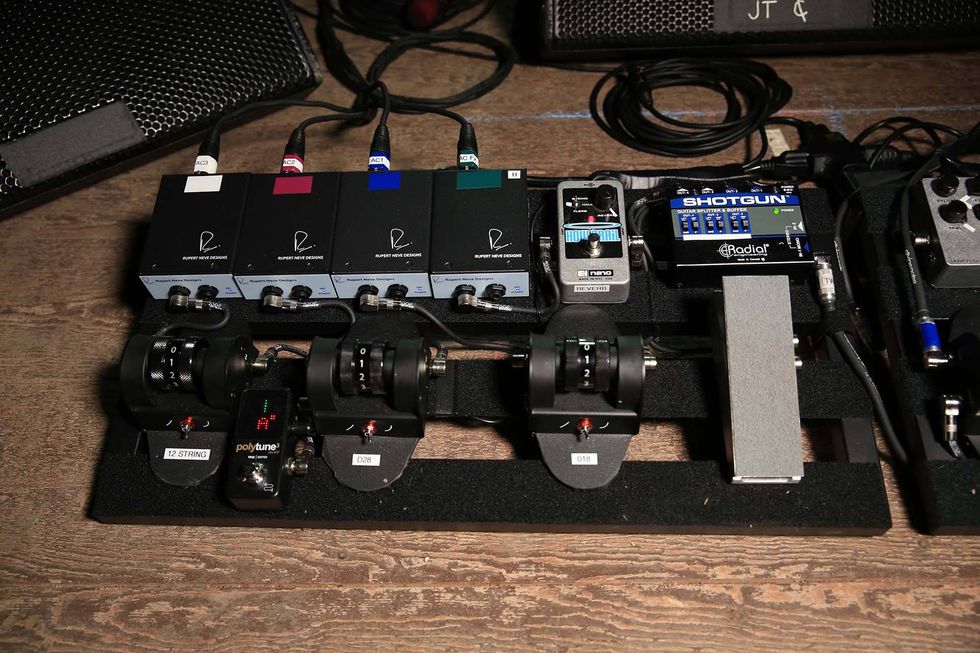
![Rig Rundown: AFI [2025]](https://www.premierguitar.com/media-library/youtube.jpg?id=62064741&width=1245&height=700&quality=70&coordinates=0%2C0%2C0%2C0)




















 Zach loves his Sovtek Mig 60 head, which he plays through a cab he built himself at a pipe-organ shop in Denver. Every glue joint is lined with thin leather for maximum air tightness, and it’s stocked with Celestion G12M Greenback speakers.
Zach loves his Sovtek Mig 60 head, which he plays through a cab he built himself at a pipe-organ shop in Denver. Every glue joint is lined with thin leather for maximum air tightness, and it’s stocked with Celestion G12M Greenback speakers.






